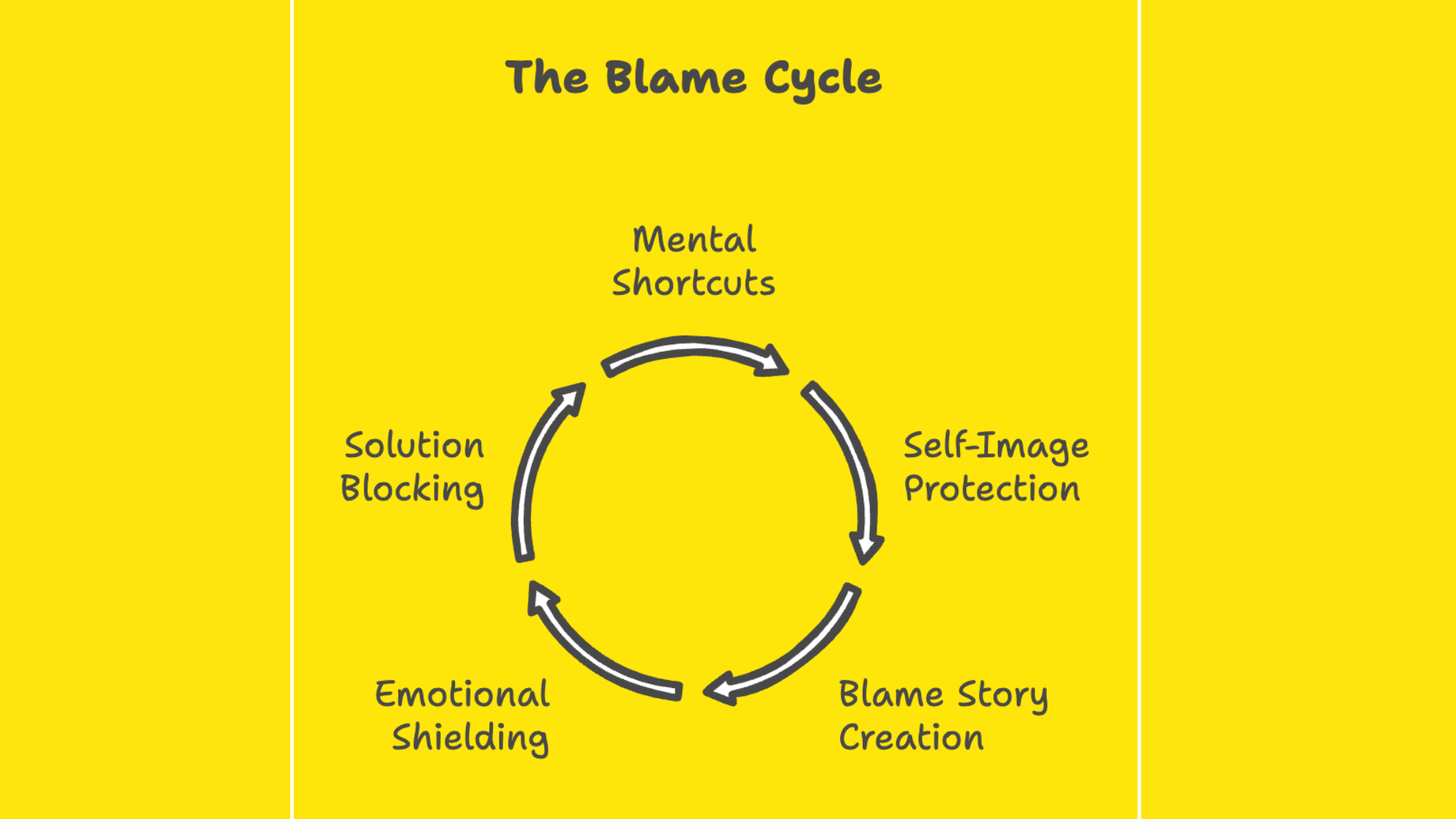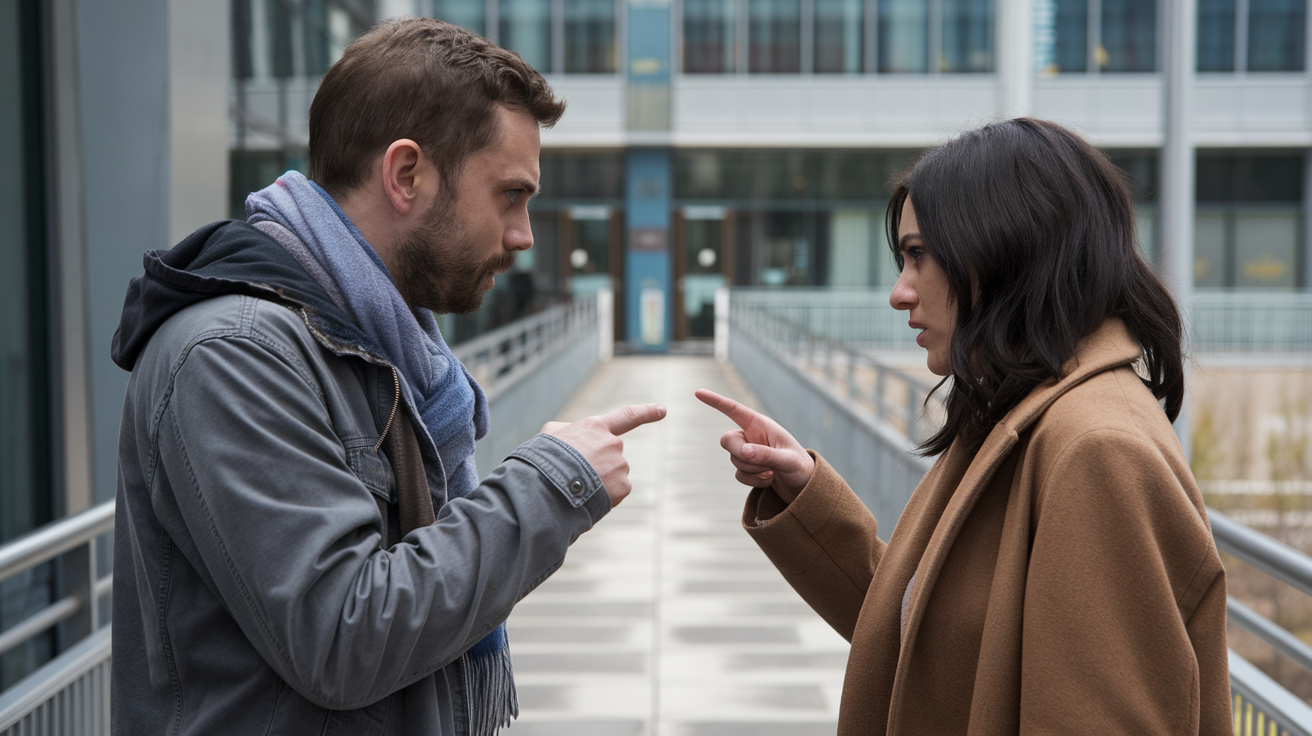Do you blame others when things go wrong?
It’s a common response that many of us share. When projects fail, or plans fall apart, pointing fingers at teammates, family members, or circumstances feels easier than accepting responsibility.
This habit of shifting blame not only damages relationships but also stops us from growing and learning from our mistakes.
But here’s the key to understanding why we choose to blame others, which can help us break this pattern.
Let’s look at the reasons behind blame-shifting and find ways to handle setbacks more effectively.
The Psychology of Blame

Usually, human brains take mental shortcuts when things go wrong. These shortcuts often lead us to look for someone else to blame rather than examine our own actions.
Research shows that people tend to blame others because it protects their self-image and helps them feel better about themselves.
When we blame others, our minds create a story where we’re the good person who got hurt by someone else’s actions. But this mental trick stops us from seeing the full truth of what happened.
Plus, it prevents us from taking steps that could actually fix the problem.
Blame also serves as a shield against difficult emotions. Instead of dealing with feelings of disappointment or failure, the mind focuses on others’ faults.
While this might feel good for a short time, it blocks the path to real solutions and personal improvement.
Key Reasons Why Do We Blame Others

Blaming others is a common defense mechanism to avoid responsibility and protect their self-image.
It often comes from psychological factors like insecurity, fear of failure, or the need to maintain control in difficult situations.
1. Fear of Looking Bad
People often blame others because they worry about what others will think of them. When mistakes happen, the thought of others seeing our faults feels scary.
So, the mind quickly points to someone else’s mistakes instead. This happens a lot at work, where looking good matters to most people.
The fear of losing respect or status pushes many to shift blame to coworkers or circumstances. But this habit only makes things worse in the long run.
2. Protecting Self-Image
Most people want to see themselves as good, capable, and right. When something goes wrong, accepting blame threatens this positive self-image.
The brain tries to protect these good feelings by finding fault in others. For example, after a failed project, someone might say their team didn’t work hard enough rather than looking at their own planning mistakes.
This mental shield might feel safe, but it stops real growth.
3. Avoiding Responsibility
Taking responsibility means dealing with consequences and fixing problems. Some people find this too hard or stressful to handle.
However, blaming others seems like an easy escape from these duties. A student might blame their teacher for a bad grade instead of studying more.
However, avoiding responsibility only leads to more problems and missed chances to improve.
4. Past Experiences
Bad experiences from childhood or previous situations can make people quickly blame others.
If someone got punished harshly for mistakes in the past, they might develop a habit of denying fault. The brain remembers these painful moments and tries to avoid similar situations.
Someone who got blamed unfairly as a child might grow up always defending themselves, even when they’re wrong.
5. Lack of Self-Awareness
Sometimes, people blame others because they can’t see their own role in problems.
Without good self-awareness, it’s hard to spot personal mistakes or bad habits. A friend might always blame others for failed relationships without seeing their own behavior patterns.
However, building better self-awareness takes time but helps break the blame cycle.
Certain Consequences of Blaming Others

Blaming others may provide temporary relief but lead to long-term negative consequences in relationships, personal growth, and mental well-being.
It creates a cycle of negativity that hinders trust, learning, and progress.
| Reason | Impact |
|---|---|
| Damaged Relationships | Blaming creates distance, making friends, family, and coworkers pull away. |
| Missed Learning Chances | It prevents personal growth by focusing on others’ faults instead of self-improvement. |
| Loss of Trust | People lose trust in those who never take responsibility, reducing teamwork and collaboration. |
| Career Setbacks | A blameful reputation limits job opportunities and professional growth. |
| Emotional Stress | Constant blame increases stress and unhappiness in daily life. |
| Poor Problem-Solving Skills | Focusing on fault-finding weakens the ability to solve real issues. |
| Lower Self-Esteem | Avoiding responsibility lowers confidence over time. |
| Stuck in Negative Patterns | Blame becomes a habit, trapping people in negativity and stopping progress. |
How to Break the Cycle of Blame

Breaking the cycle of blame requires self-awareness, accountability, and a shift in mindset.
And, you can build stronger relationships and promote personal growth by focusing on solutions instead of fault-finding.
Pause Before Reacting
When something goes wrong, take a moment before responding. Deep breaths can help you calm down and assess the situation rationally.
This brief pause can stop the automatic urge to blame others and allow you to approach the problem with a clearer mindset.
Ask Better Questions
Instead of immediately looking for someone to blame, shift your focus to learning and solutions. Instead of asking, “Who messed up?” try asking, “What can we learn from this?” or “How can we prevent this from happening again?”
This change in approach encourages problem-solving and teamwork rather than finger-pointing.
Own Your Part
Take responsibility for your actions before looking at others’ mistakes. If something goes wrong, reflect on your role in the situation.
Did you forget to follow up on an important task? Could you have communicated more clearly? Admitting your part in a problem encourages others to do the same and creates a culture of accountability.
Track Blame Patterns
Pay attention to when and why you tend to blame others. Do you do it more often when you’re stressed, overwhelmed, or interacting with specific people?
Recognizing these patterns can help you catch yourself before falling into the habit of blame, allowing you to change your response over time.
View Mistakes as Growth Opportunities
Instead of seeing mistakes as failures, reframe them as chances to improve. When you catch yourself starting to blame, shift your mindset to “How can this help me grow?”
This perspective promotes strength, learning, and a more positive approach to handling challenges.
Encourage Shared Responsibility
Promote teamwork by using inclusive language when addressing problems. Instead of saying, “You made a mistake,” try, “let’s figure out how to prevent this next time.”
This approach reduces defensiveness, builds trust, and helps create a supportive environment where everyone feels responsible for solutions.
Conclusion
Lastly, breaking free from blame patterns takes time, but the rewards make it worthwhile.
When you stop pointing fingers at others, your relationships improve, your problem-solving gets better, and you grow stronger as people.
Each time you catch yourself ready to blame someone else, remember that choosing responsibility leads to real solutions and lasting change.
Ready to make a change? The next time something goes wrong, take a moment before reacting. Write down what happened and look for your part in it.
Share your story in the comments below – what made you think about your blame habits?
Frequently Asked Questions
What is the Psychological Term for Blaming Others?
The psychological term is “projection” – when people put their own faults onto others to avoid dealing with uncomfortable feelings about themselves.
What Type of Personality Blames Others?
People with defensive personalities often blame others. They find it hard to accept mistakes and protect themselves by finding fault in others.
What Mental Illness is Blaming Others?
Constant blaming of others can be a sign of narcissistic personality patterns or victim mentality. It’s a way for some people to cope with stress and personal problems.








